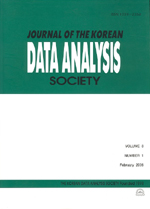노인의 우울, 기분상태와 생활만족도
Depression, Mood States and Life-Satisfaction of the Elderly in Korea
- 한국자료분석학회
- Journal of The Korean Data Analysis Society (JKDAS)
- Vol.10 No.6
-
2008.123091 - 3106 (16 pages)
- 23

본 연구는 65세 이상 노인을 대상으로 우울, 기분상태, 생활만족정도와 이의 상관관계를 파악하고, 생활만족도의 영향요인을 분석하여, 노년기 삶의 질 향상을 위한 간호중재 프로그램 개발에 기여하기 위한 서술적 상관관계연구이다. 연구대상은 239명의 평균 연령 72.1세 노인이었다. 노인의 우울은 평균 2.54점(5점 만점), 기분상태는 평균 1.38점(4점 만점)을 보였고, 생활만족도는 평균 3.00점(5점 만점)이었으며, 이들 요인은 각기 노인의 사회경제적 특성에 따라 유의한 차이가 있었다. 노인의 우울, 기분상태, 생활만족도는 유의한 상관관계를 나타냈으며, 생활만족도는 우울이 낮을수록(r=.668, p<.001), 기분상태가 좋을수록(r=-.452, p<.001) 높았으며, 우울이 심할수록 기분상태도 더 저조하게(r=-.452, p<.001) 나타났다. 다중 회귀분석을 실시한 결과 노인의 생활만족도에 영향을 미치는 요인으로 우울, 기분상태, 일상생활정도, 거주지와 학력이 59.7%의 설명력을 보여 중요한 요인임을 알 수 있었으며 본 연구결과를 바탕으로 노인의 우울감소와 생활만족도를 높일 수 있는 실질적인 간호중재의 개발 및 적용방안 마련이 요구된다.
Purpose: The study was done to identify the depression, mood states and life-satisfaction of the elderly people in Korea. Method: A cross-sectional descriptive study was performed from July to October 2005 on 239 subjects(mean age=72.1) in community-dwelling elder by convenience sample method. Data was analyzed by frequencies, percentages, t-test, ANOVA, post hoc scheffe test and multiple regressions. Result: The mean score of depression was 2.54 of total 5, mood states was 1.38 of total 4, and life-satisfaction was 3.0 of total 5, and there was a significant difference according to socio-demographic status and significant relationship among three variables. The contributing factors of life-satisfaction in the multiple regression analysis were depression and mood states (Adj R2= .597). Conclusion: These results suggest that strategies for nursing intervention program on depression and mood states of the elderly are lead to improve their life-satisfaction and quality of life.
I. 서론
II. 연구 방법
III. 연구결과
IV. 논의
V. 결론 및 제언
참고문헌
(0)
(0)